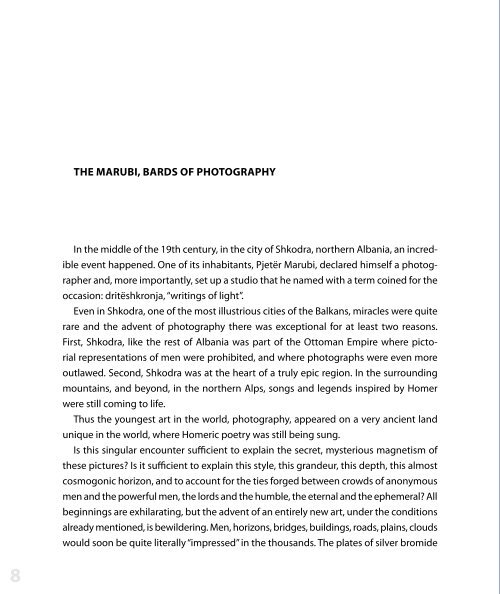Marubi - Écrits de lumière
Marubi - Écrits de lumière
Marubi - Écrits de lumière
Create successful ePaper yourself
Turn your PDF publications into a flip-book with our unique Google optimized e-Paper software.
THE MARUBI, BARDS OF PHOTOGRAPHY<br />
In the middle of the 19th century, in the city of Shkodra, northern Albania, an incred-<br />
ible event happened. One of its inhabitants, Pjetër <strong>Marubi</strong>, <strong>de</strong>clared himself a photog-<br />
rapher and, more importantly, set up a studio that he named with a term coined for the<br />
occasion: dritëshkronja, “writings of light”.<br />
Even in Shkodra, one of the most illustrious cities of the Balkans, miracles were quite<br />
rare and the advent of photography there was exceptional for at least two reasons.<br />
First, Shkodra, like the rest of Albania was part of the Ottoman Empire where picto-<br />
rial representations of men were prohibited, and where photographs were even more<br />
outlawed. Second, Shkodra was at the heart of a truly epic region. In the surrounding<br />
mountains, and beyond, in the northern Alps, songs and legends inspired by Homer<br />
were still coming to life.<br />
Thus the youngest art in the world, photography, appeared on a very ancient land<br />
unique in the world, where Homeric poetry was still being sung.<br />
Is this singular encounter sucient to explain the secret, mysterious magnetism of<br />
these pictures? Is it sucient to explain this style, this gran<strong>de</strong>ur, this <strong>de</strong>pth, this almost<br />
cosmogonic horizon, and to account for the ties forged between crowds of anonymous<br />
men and the powerful men, the lords and the humble, the eternal and the ephemeral? All<br />
beginnings are exhilarating, but the advent of an entirely new art, un<strong>de</strong>r the conditions<br />
already mentioned, is bewil<strong>de</strong>ring. Men, horizons, bridges, buildings, roads, plains, clouds<br />
would soon be quite literally “impressed” in the thousands. The plates of silver bromi<strong>de</strong><br />
MARUBËT, AEDË TË FOTOGRAFISË<br />
Në mesin e shekullit të nëntëmbëdhjetë në qytetin e Shkodrës, në Shqipërinë veriore,<br />
ndodhi diçka e pazakontë: një qytetar shkodran me emrin Pjetër <strong>Marubi</strong> u bë fotograf,<br />
madje hapi dhe një studio që e quajti “Dritëshkronja”.<br />
Ngjarja quhej e pazakontë madje edhe në Shkodër, një nga qytetet më të famshëm<br />
të Gadishullit Ballkanik, ku jo rrallë ndodhnin çudira, për dy arsye. E para, sepse Shkodra,<br />
ashtu si gjithë Shqipëria, bënte pjesë në Perandorinë Osmane, ku pikturimi i njerëzve<br />
vazhdonte të ishte tradicionalisht i ndaluar, rrjedhimisht fotogrami i tyre duhej të ishte<br />
edhe më i ndaluar. Arsyeja e dytë, sepse ky qytet i madh ndodhej në qendrën e një<br />
zonë të vërtetë epike. Rreth e rrotull në bjeshkë e më tutje në alpet veriore vazhdonin<br />
të krijoheshin këngë e legjenda të brumit homerik të cilat, ndonëse në muzgun e tyre,<br />
vijonin të rrezatonin fuqishëm kudo.<br />
Kështu pra arti më i ri në botë, ai i fotogramit, ia behu befas në truallin e stërmoçëm,<br />
në këndin ndoshta të vetëm të globit tokësor ku prodhohej en<strong>de</strong> poezi homerike.<br />
Nga kjo n<strong>de</strong>shje e rrallë shpjegohet me sa duket tërheqja e fshehtë, gati misterioze,<br />
e këtyre fotograve, stili i tyre, përmasat, gjerësia, një prirje gati kozmogjenike, një gër-<br />
shetim i anonimatit me elitën e kombit, i zotave dhe i turmave, i asaj që nuk v<strong>de</strong>s kurrë<br />
dhe i tjetrës që tretet mu në sytë tanë.<br />
Të gjitha llimet janë <strong>de</strong>hëse, por llimi i një arti të ri, në kushtet e mësipërme, ishte<br />
më se tronditës. Do të fotografoheshin mijëra e mijëra qenie njerëzore, pamje, ura,<br />
ndërtesa, rrugë, tokë, re. Në pllakat me bromur argjendi do të ksoheshin fytyra të<br />
8 9


